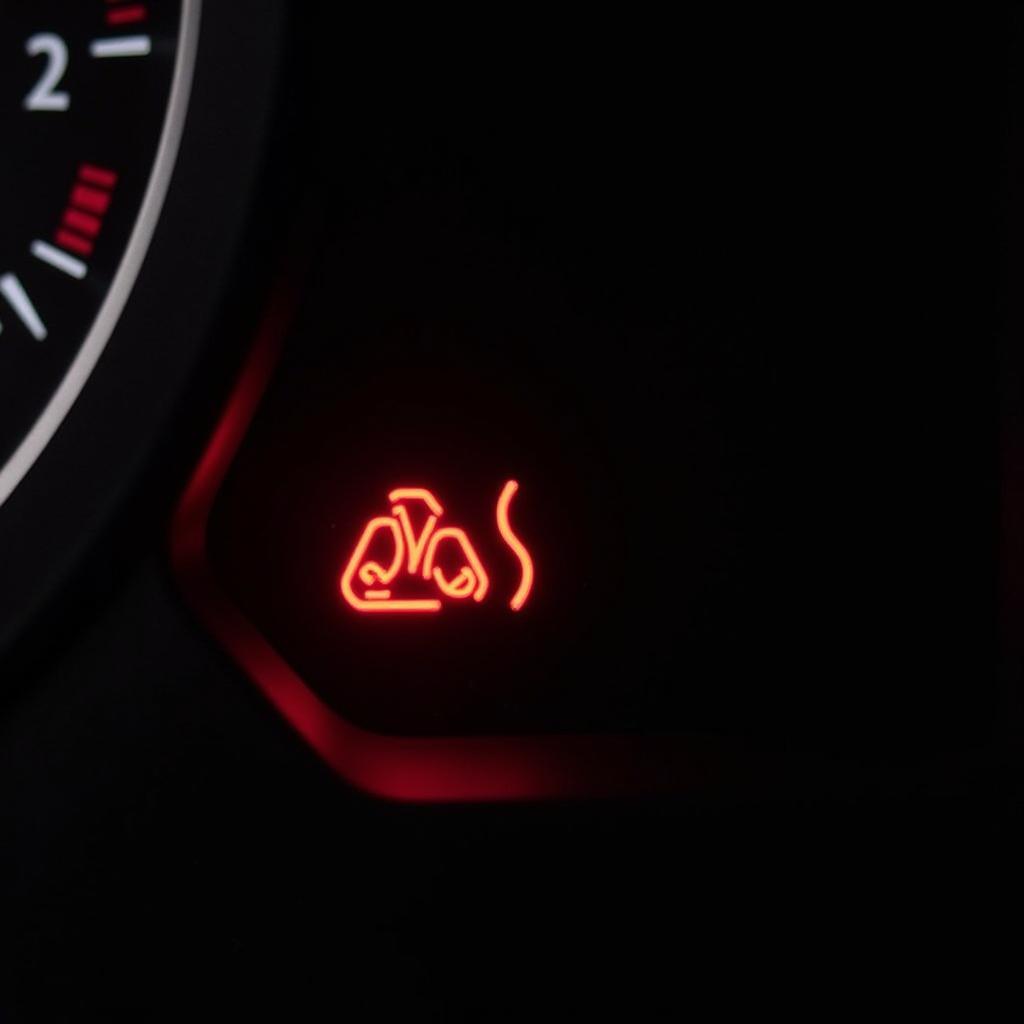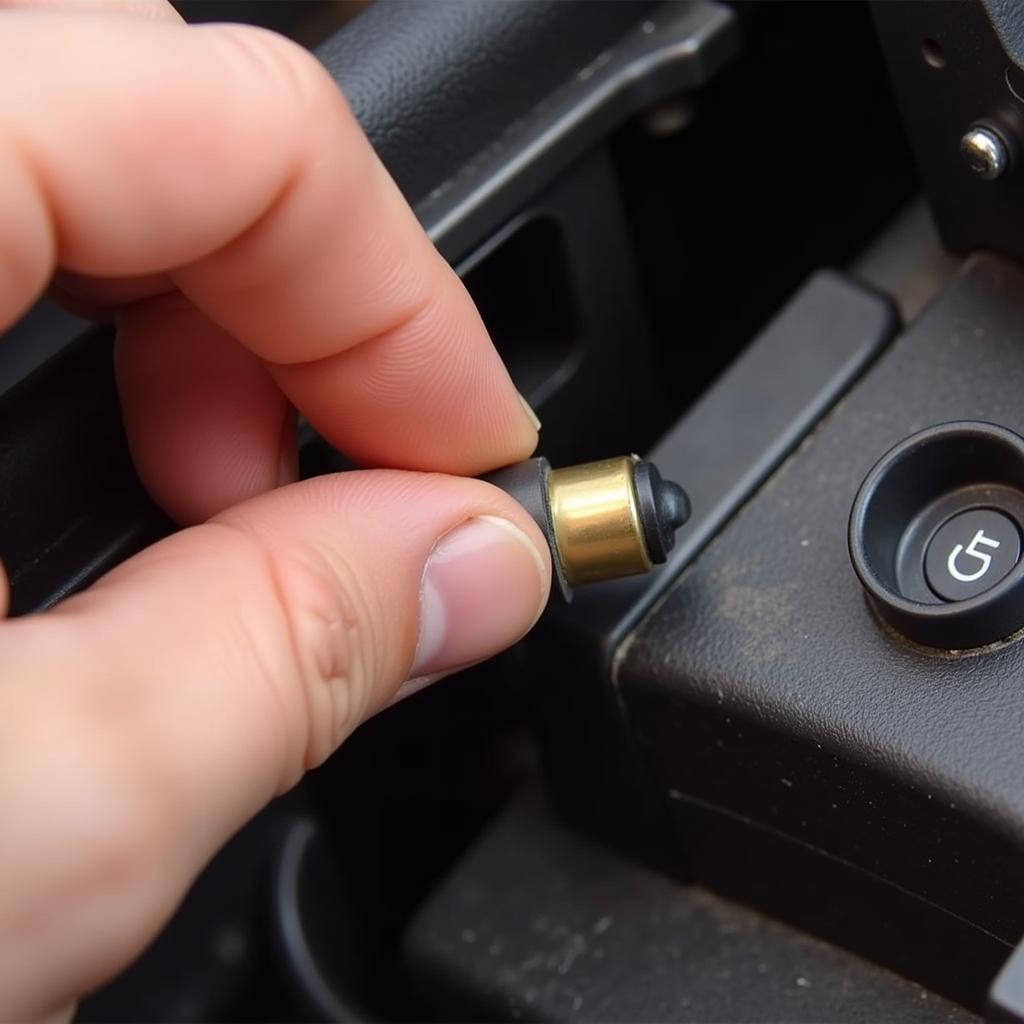The dreaded nissan brake warning light. It’s a sight no Nissan driver wants to see, but understanding what it means and how to address it can save you time, money, and potential headaches. This comprehensive guide will delve into the various reasons behind a nissan brake warning light, providing practical solutions and expert insights to help you get back on the road safely.
 Nissan Brake Warning Light on Dashboard
Nissan Brake Warning Light on Dashboard
One common reason for the nissan brake warning light to illuminate is low brake fluid. Your braking system relies on hydraulic pressure, and if the fluid level drops too low, the warning light will activate. This could indicate a leak in the brake lines, which requires immediate attention. Another possibility is worn brake pads. Brake pads are designed to wear down over time, and when they reach a certain point, a sensor triggers the warning light. Regular brake inspections can prevent this issue.
Understanding the Nissan Brake Warning Light
Why is understanding the nissan brake warning light so crucial? Simply put, your brakes are arguably the most important safety feature in your vehicle. Ignoring this warning light could lead to brake failure, putting you and others at risk. Don’t delay, address it today! What does it mean when the light is on? It could signal anything from low brake fluid to a serious issue with the ABS system.
What to Do When the Light Comes On
First, don’t panic! Pull over to a safe location and check your owner’s manual. nissan maxima brake warning light often share similar causes. Your manual will provide specific information for your Nissan model. If you’re comfortable, check your brake fluid level. If it’s low, adding brake fluid might temporarily resolve the issue, but you still need to identify the underlying cause of the leak. If you’re not comfortable checking the fluid level yourself, or if the light remains on after adding fluid, it’s time to seek professional help.
Nissan Brake Warning Light and the ABS System
Sometimes, the nissan brake warning light can be related to the Anti-lock Braking System (ABS). The ABS system prevents wheel lockup during hard braking, allowing you to maintain steering control. If the ABS warning light illuminates alongside the brake warning light, it suggests a potential issue within the ABS system itself. This could be a faulty sensor, a problem with the ABS module, or a wiring issue.
nissan x trail brake warning light can sometimes illuminate due to similar issues as other Nissan models. Diagnosing and repairing ABS problems requires specialized diagnostic equipment, so it’s best to leave this to a qualified technician.
Common Causes and Solutions
A common cause of the nissan brake warning light is a faulty parking brake switch. 2014 nissan altima brake warning light issues have been reported in online forums, often related to a malfunctioning parking brake switch. If the switch is stuck in the “on” position, it can trigger the warning light even when the parking brake is disengaged. Replacing the switch is a relatively simple fix.
Another potential culprit is a worn brake master cylinder. The master cylinder is responsible for generating the hydraulic pressure needed to activate the brakes. If it’s leaking or malfunctioning, it can cause the brake warning light to come on. Replacing the master cylinder is more complex than replacing a parking brake switch and should be done by a professional.
nissan sentra brake pedal warning light sometimes points to a similar issue. “A properly functioning brake system is paramount for safety,” says John Davis, a certified automotive technician with over 20 years of experience. “Ignoring a brake warning light is akin to playing Russian roulette with your life.”
Remote Diagnostics and Programming for Nissan Brake Issues
Modern technology allows for remote diagnostics and programming to address certain nissan brake warning light issues. This involves connecting your vehicle to a diagnostic tool that communicates with a remote technician. nissan yellow shw and brake pedal warning light can sometimes be diagnosed and even repaired remotely. The technician can analyze the data, identify the problem, and in some cases, even reprogram certain modules to resolve the issue without requiring a physical visit to the repair shop. This can be a convenient and cost-effective solution for certain types of brake problems.
“Remote diagnostics are changing the landscape of automotive repair,” adds Sarah Miller, a software engineer specializing in automotive applications. “It allows us to address issues quickly and efficiently, minimizing downtime for drivers.”
In conclusion, the nissan brake warning light is a serious signal that should never be ignored. Understanding the potential causes and taking prompt action can prevent costly repairs and ensure your safety on the road. Whether it’s a simple fix like topping off the brake fluid or a more complex issue requiring professional attention, addressing the brake warning light quickly is essential.
FAQ
-
What does the nissan brake warning light mean? It signals a potential problem with your braking system, such as low brake fluid, worn brake pads, or an issue with the ABS.
-
Is it safe to drive with the brake warning light on? No, it is not safe. Continuing to drive could lead to brake failure.
-
Can I fix the problem myself? Simple tasks like adding brake fluid might offer a temporary solution, but it’s best to have a professional diagnose and repair the underlying issue.
-
How much does it cost to fix a nissan brake warning light issue? The cost varies depending on the underlying cause, ranging from a few dollars for brake fluid to hundreds or even thousands for more complex repairs.
-
How can I prevent the brake warning light from coming on? Regular brake inspections and maintenance are crucial for preventing brake problems.
-
What is the ABS warning light? The ABS light indicates a problem with the Anti-lock Braking System.
-
What should I do if both the brake warning light and the ABS light are on? Seek professional help immediately. This suggests a potentially serious issue with your braking system.

